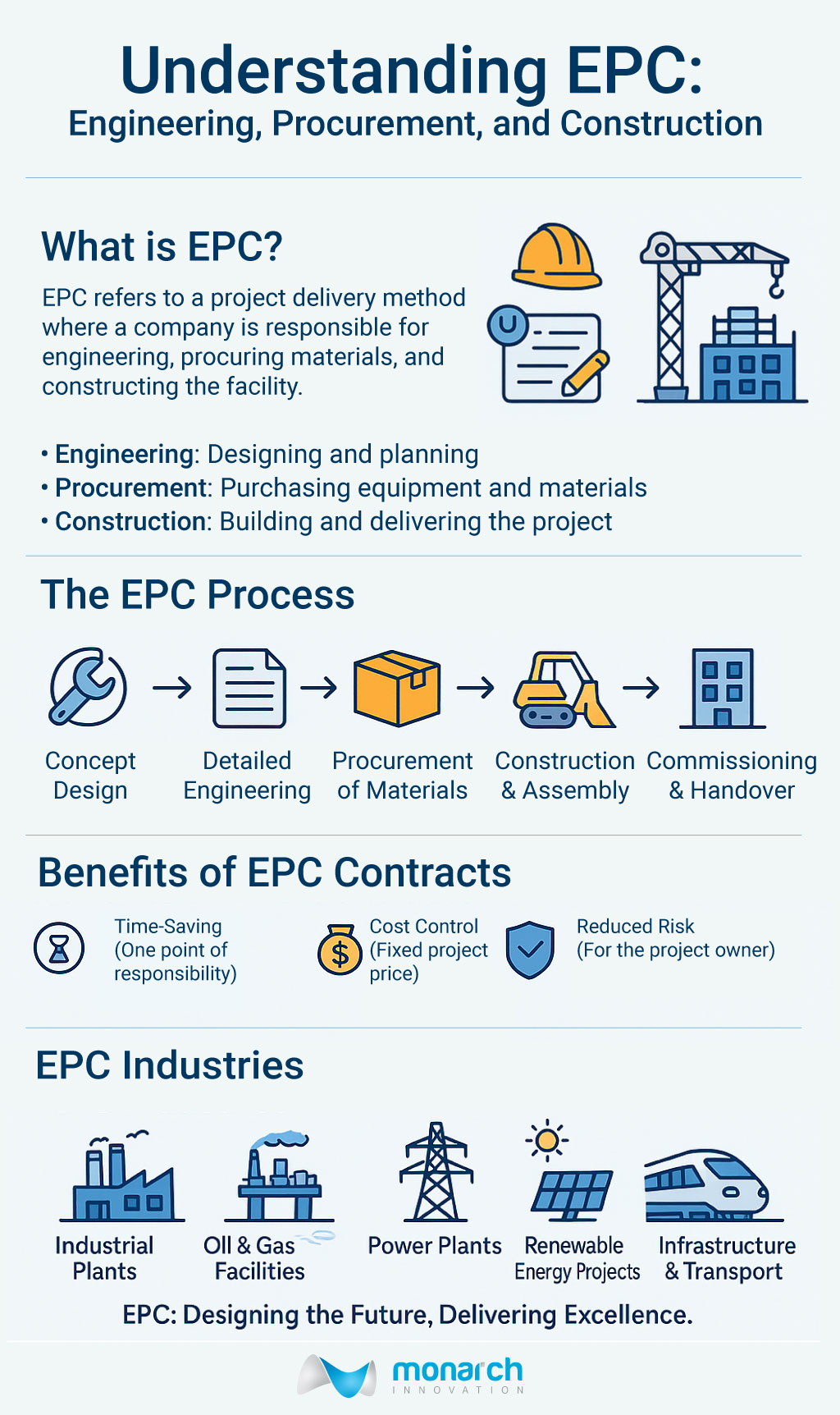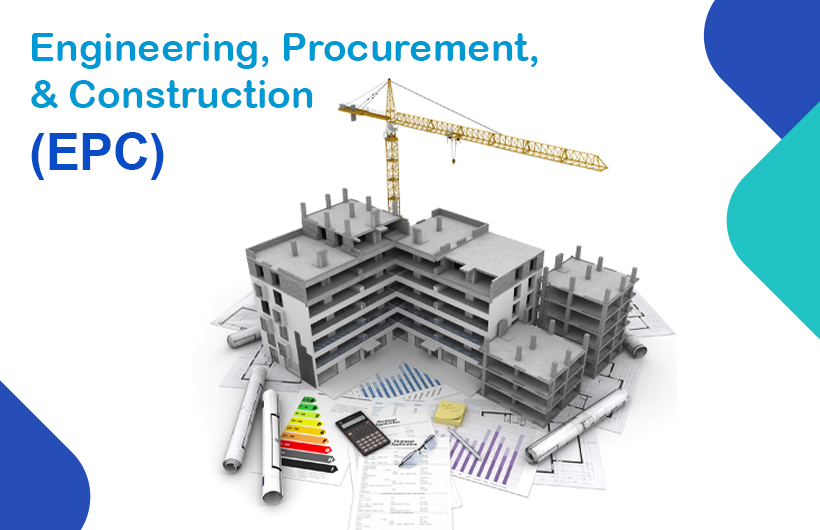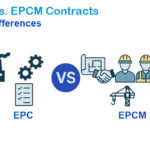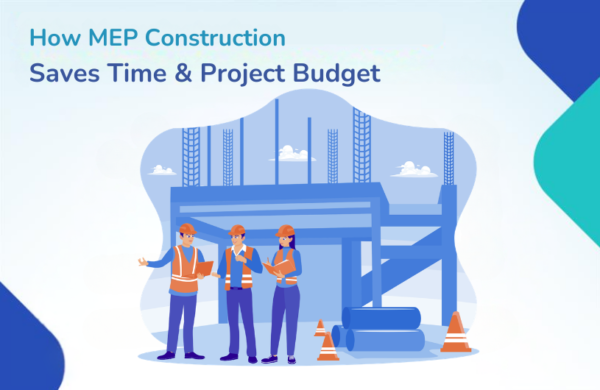EPC contracts are a cornerstone of large-scale construction and industrial projects, ensuring seamless execution from design to completion. Delivering projects on time, within budget, and to the highest quality standards, EPC contracting plays a crucial role, whether it’s power plants, oil refineries, or infrastructure development.
This blog delves into the concept of EPC contracting, its working mechanism, the responsibilities of EPC construction companies, and the essential elements of engineering, procurement, and construction projects.
What is the Full form of EPC?
EPC stands for Engineering, Procurement, and Construction, a project delivery model where a single contractor (the EPC contractor) is responsible for all project stages. This includes:
- Engineering – Detailed design and technical specifications.
- Procurement – Sourcing materials, equipment, and subcontractors.
- Construction – Physical building and commissioning of the project.
EPC contracts are commonly used in industries like energy, oil & gas, infrastructure, and manufacturing. A smooth approach is required for complex, large-scale projects.

How Does an EPC Contract Work?
To handle the entire project lifecycle under an EPC contract, the client (project owner) hires an EPC contractor. Here’s how it typically works:
1. Engineering & Design (E)
The EPC contractor develops detailed engineering designs, including architectural, structural, and mechanical plans. This stage makes sure the project meets technical, safety, and regulatory standards.
2. Project Planning & Feasibility Study
Before awarding an EPC contract, the client conducts feasibility studies to assess project durability. Once approved, they select an EPC contractor through a bidding process.
3. Procurement (P)
The contractor sources materials, equipment, and subcontractors. Efficient procurement is critical to avoid delays and cost overruns.
4. Commissioning & Handover
Once construction is complete, the contractor tests systems, ensures operational readiness, and hands the project over to the client.
5. Construction (C)
The EPC construction company oversees the entire building process, ensuring high-quality standards, adherence to safety regulations, and on-time project delivery.
Key Benefits of EPC Contracts
1. Single-Point Responsibility
Since the EPC contractor manages all aspects, the client has a single point of contact, reducing coordination hassles.
2. High-Quality Standards
EPC construction companies specialize in large-scale projects, ensuring adherence to the industry’s best practices and regulatory compliance.
3. Faster Project Completion
With streamlined engineering, procurement, and construction processes, EPC contracts often lead to faster project delivery.
4. Fixed Pricing & Reduced Risk
Most EPC contracts are fixed prices, meaning the contractor carries the cost of running over risks, providing budget certainty for the client.
Challenges in EPC Contracting
While EPC contracts offer many advantages, they also come with challenges:
- High Initial Costs – EPC contractors may charge a premium for taking on full project risk.
- Complex Contract Negotiations – Defining scope, timelines, and penalties requires careful drafting.
- Dependency on Contractor Performance – Poor management by the EPC firm can lead to delays.
To mitigate risks, clients must choose experienced EPC engineering services providers with a strong track record.
EPC vs. Traditional Construction Contracts
| Aspect | EPC Contract | Traditional Contract |
| Responsibility | Single contractor handles everything | Multiple contractors for design, procurement, and construction |
| Risk | Mostly on the EPC contractor | A single contractor handles everything |
| Cost Structure | Fixed-price or lump-sum | Often cost-plus or time-and-material |
| Project Control | Contractor-led | Shared between the client and contractors |
EPC contracts are ideal for clients who want a hands-off approach, while traditional contracts may suit those who prefer more control.
Choosing the Right EPC Construction Companies
For project success, it is crucial to select a reliable EPC contractor. Here’s what to consider:
1. Experience & Track Record
Look for firms with expertise in similar projects (e.g., power plants, refineries, or infrastructure).
2. Past Client Reviews
Check references and past project performance to assess reliability.
3. Financial Stability
EPC projects require significant investment and ensure the contractor has strong financial backing.
4. Technical Capabilities
Verify their engineering, procurement, and construction expertise, including compliance with industry standards.
EPC Design & Engineering Services
A critical part of EPC contracting is the engineering and design phase, which includes:
- Conceptual & Detailed Design – Creating project blueprints.
- Feasibility Studies – Assessing technical and economic viability.
- Regulatory Compliance – Ensuring adherence to safety and environmental laws.
Strong EPC engineering services help prevent costly design errors during construction.
Future of EPC Contracting
The EPC industry is evolving with trends like:
- Digitalization – Using BIM (Building Information Modelling) and AI for better project planning.
- Sustainability – Green construction practices and renewable energy projects.
- Modular Construction – Pre-fabrication to reduce on-site work and costs.
EPC construction companies that adapt to these trends will lead the market.
EPC contracting simplifies complex projects by consolidating engineering, procurement, and construction under one roof. Whether you’re developing a power plant, refinery, industrial facility, or looking for a trusted engineering and design company, partnering with a reputable EPC contractor like Monarch Innovation ensures efficiency, cost control, and risk reduction.
By understanding the nuances of EPC construction contracts, businesses can make informed decisions and achieve seamless project execution. At Monarch Innovation, we specialise in delivering end-to-end EPC engineering services with precision and reliability. Our expertise spans:
Need expert EPC solutions? Contact Monarch Innovation today!
FAQs
1. What is the difference between EPC and a normal contract?
An EPC (Engineering, Procurement, and Construction) contract bundles design, procurement, and construction under one contractor, offering a streamlined, single-point responsibility. In contrast, a normal contract separates these phases, requiring the client to manage multiple contractors, which can lead to delays and higher costs.
2. What is the EPC contract type?
An EPC contract is a project delivery method where the contractor handles the Engineering, Procurement, and Construction phases. In this contract type, the contractor takes full responsibility for designing, sourcing materials, and building the project, ensuring it meets the client’s specifications, budget, and timeline. It simplifies project management by providing a single point of contact and reducing risks for the client.
3. What is the tendering process in EPC?
The EPC tendering process involves the client defining the project scope, inviting contractors to submit bids, evaluating proposals based on cost and expertise, and awarding the contract to the most suitable bidder. This process ensures transparency and selects the right contractor for successful project execution.





